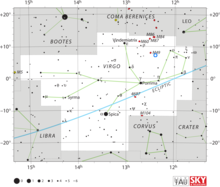NGC 4365
| NGC 4365 | |
|---|---|
 Hubble Space Telescope image of NGC 4365 | |
| Observation data (J2000 epoch) | |
| Constellation | Virgo |
| Right ascension | 12h 24m 28.228s[1] |
| Declination | +07° 19′ 03.07″[1] |
| Redshift | −0.00022[2] |
| Heliocentric radial velocity | −66 km/s[2] |
| Distance | 74.4 Mly (22.80 Mpc)[3] |
| Apparent magnitude (B) | 11.5[2] |
| Characteristics | |
| Type | E3[4] |
| Other designations | |
| UGC 7488, MCG +01-32-048, PGC 40375[2] | |

NGC 4365 is an elliptical galaxy[5] located in the constellation Virgo. It was discovered by William Herschel on April 13, 1784.[6][7][8]
NGC 4365 is the central galaxy of W' cloud, a cloud of galaxies about 6 megaparsecs behind (further from us than) the Virgo Supercluster.[9] NGC 4365 has a kinematically distinct, counter-rotating stellar core region, which provides strong evidence for the theory that elliptical galaxies grow through mergers.[10] The mean age of its stellar population is greater than 12 billion years, and it retains a triaxial structure that has remained largely unchanged for 12 billion years. Because supermassive black holes in the centers of galaxies tend to scatter stars into chaotic new orbits, the longevity of NGC 4365's triaxial structure and kinematically distinct stellar populations indicates that it cannot have a supermassive black hole with a mass greater than 3×109 M☉.[11]
There is a stream of globular clusters connecting NGC 4365 to the neighboring compact S0 galaxy NGC 4342. It appears that NGC 4365 is stripping globular clusters and stars from its neighbor via tidal interaction.[9]
References
- ^ a b Skrutskie, Michael F.; Cutri, Roc M.; Stiening, Rae; Weinberg, Martin D.; Schneider, Stephen E.; Carpenter, John M.; Beichman, Charles A.; Capps, Richard W.; Chester, Thomas; Elias, Jonathan H.; Huchra, John P.; Liebert, James W.; Lonsdale, Carol J.; Monet, David G.; Price, Stephan; Seitzer, Patrick; Jarrett, Thomas H.; Kirkpatrick, J. Davy; Gizis, John E.; Howard, Elizabeth V.; Evans, Tracey E.; Fowler, John W.; Fullmer, Linda; Hurt, Robert L.; Light, Robert M.; Kopan, Eugene L.; Marsh, Kenneth A.; McCallon, Howard L.; Tam, Robert; Van Dyk, Schuyler D.; Wheelock, Sherry L. (1 February 2006). "The Two Micron All Sky Survey (2MASS)". The Astronomical Journal. 131 (2): 1163–1183. Bibcode:2006AJ....131.1163S. doi:10.1086/498708. ISSN 0004-6256. S2CID 18913331.
- ^ a b c d "NGC 4365". SIMBAD. Centre de données astronomiques de Strasbourg. Retrieved 2020-12-12.
- ^ Tully, R. Brent; Courtois, Hélène M.; Sorce, Jenny G. (2016). "Cosmicflows-3". The Astronomical Journal. 152 (2): 21. arXiv:1605.01765. Bibcode:2016AJ....152...50T. doi:10.3847/0004-6256/152/2/50. S2CID 250737862. 50.
- ^ "Results for object NGC 4365 (NGC 4365)". NASA/IPAC Extragalactic Database. California Institute of Technology. Retrieved 2020-12-12.
- ^ "The elliptical galaxy NGC 4365". www.eso.org. European Southern Observatory. Retrieved 2020-10-28.
- ^ Larsen, S. S.; Brodie, J. P.; Strader, J. (2005-11-01). "Globular clusters in NGC 4365: new K-band imaging and a reassessment of the case for intermediate-age clusters". Astronomy & Astrophysics. 443 (2): 413–433. arXiv:astro-ph/0508181. Bibcode:2005A&A...443..413L. doi:10.1051/0004-6361:20053379. S2CID 1358900. Retrieved 2020-10-28.
- ^ "NGC4365CXO - NGC 4365 Chandra LMXB Catalog". heasarc.gsfc.nasa.gov. Goddard Space Flight Center. Retrieved 2020-10-28.
- ^ Brodie, Jean P.; Strader, Jay; Denicoló, Glenda; Beasley, Michael A.; Cenarro, A. J.; Larsen, Søren S.; Kuntschner, Harald; Forbes, Duncan A. (2005-06-01). "Old Globular Clusters Masquerading as Young in NGC 4365?". The Astronomical Journal. 129 (6): 2643–2653. arXiv:astro-ph/0502467. Bibcode:2005AJ....129.2643B. doi:10.1086/429889. S2CID 13987584. Retrieved 2020-10-28.
- ^ a b Blom, Christina; Forbes, Duncan A.; Foster, Caroline; Romanowsky, A. J.; Brodie, Jean P. (April 2014). "The SLUGGS Survey: new evidence for a tidal interaction between the early-type galaxies NGC 4365 and NGC 4342". Monthly Notices of the Royal Astronomical Society. 439 (3): 2420–2431. arXiv:1401.5128. Bibcode:2014MNRAS.439.2420B. doi:10.1093/mnras/stu095.
- ^ Surma, P.; Bender, R. (June 1995). "Relics of dissipational merging and past violent starbursts in elliptical galaxies - the gE galaxy NGC 4365". Astronomy and Astrophysics. 298: 405. Bibcode:1995A&A...298..405S. Retrieved 9 February 2021.
- ^ Statler, Thomas S.; Emsellem, Eric; Peletier, Reynier F.; Bacon, Roland (2004). "Long-lived triaxiality in the dynamically old elliptical galaxy NGC 4365: a limit on chaos and black hole mass". Monthly Notices of the Royal Astronomical Society. 353 (1): 1–14. arXiv:astro-ph/0406103. Bibcode:2004MNRAS.353....1S. doi:10.1111/j.1365-2966.2004.08062.x.
External links
 Media related to NGC 4365 at Wikimedia Commons
Media related to NGC 4365 at Wikimedia Commons
